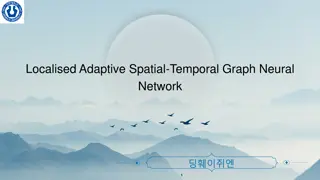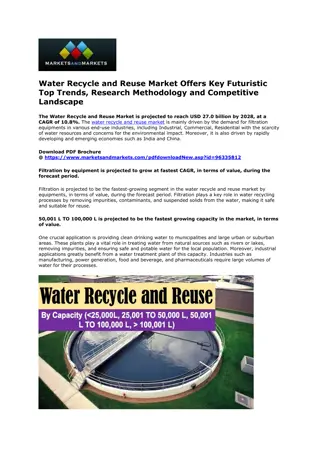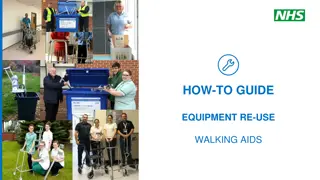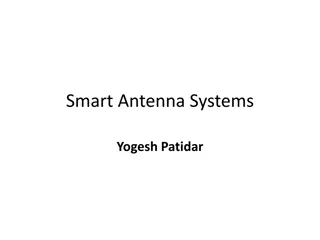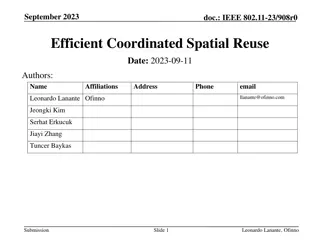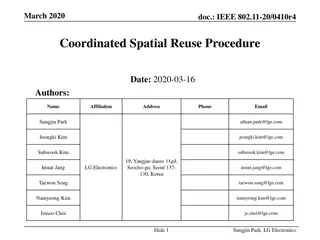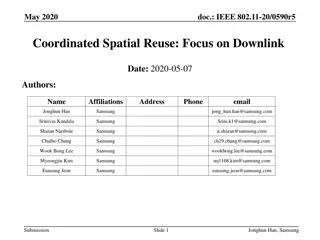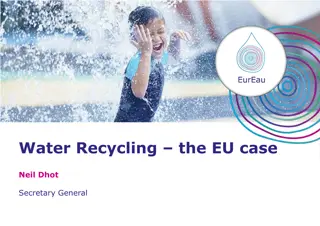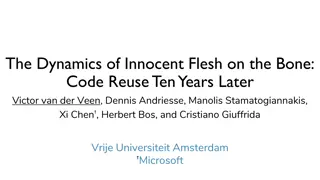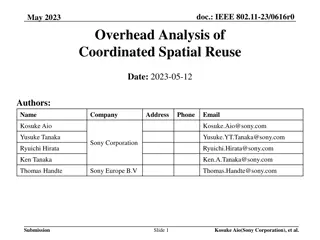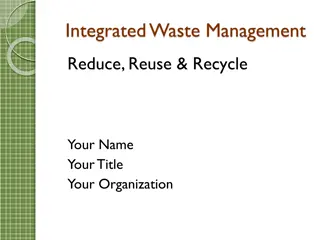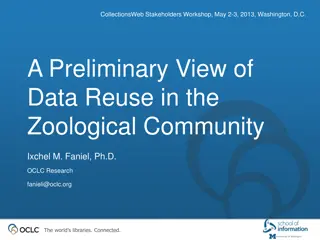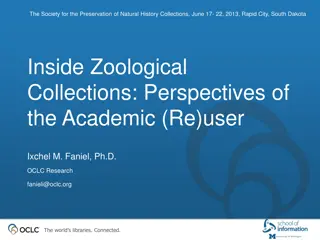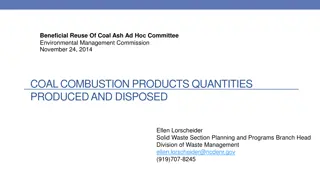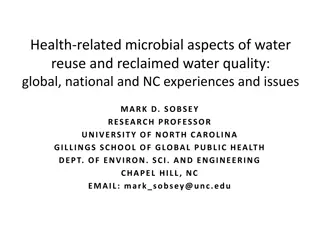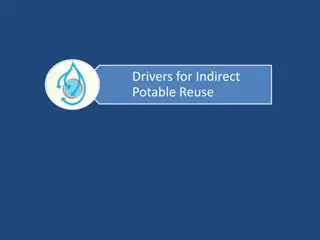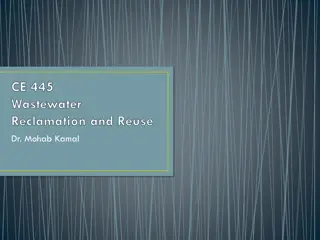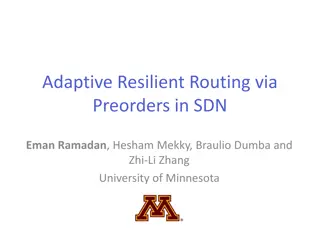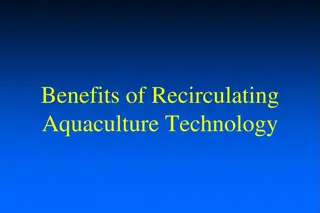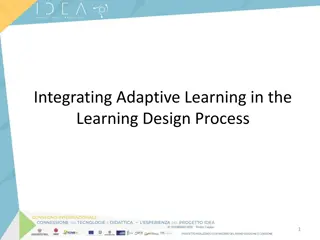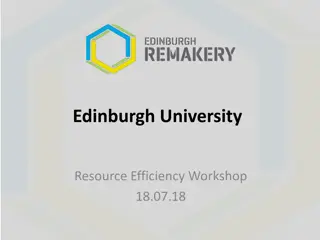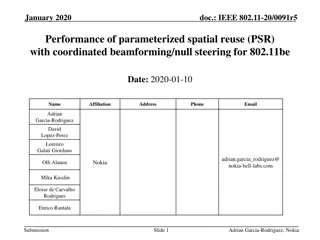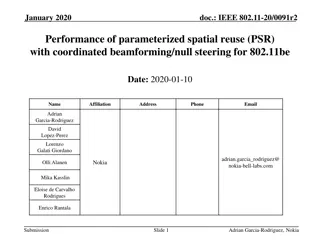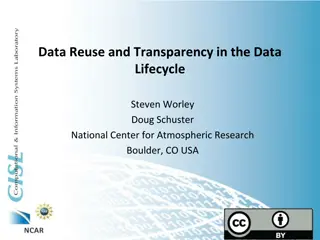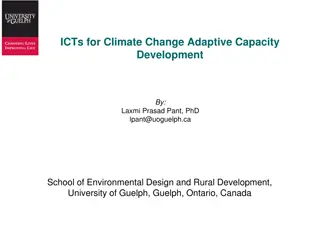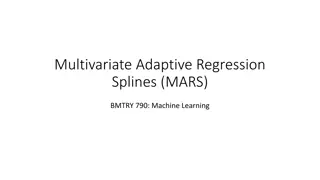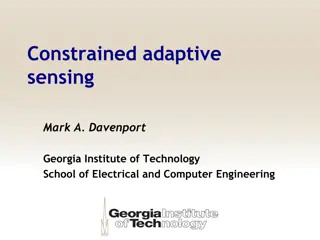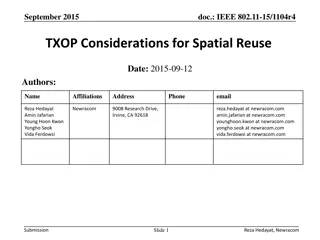Coordinated Spatial Reuse
Explore the concept of Coordinated Spatial Reuse (C-SR) in IEEE 802.11 networks, a scheme where multiple access points (APs) transmit data simultaneously to reduce interference and enhance resource utilization. Learn about the definition, benefits, and necessary components for successful C-SR operat
0 views • 15 slides
Urban Mining and CDW Circular Economy Cost-Benefit Analysis
This case study focuses on comparing the cost and greenhouse gas emissions savings of local processing and reuse of Construction and Demolition Waste (CDW) materials versus sending them to landfills. By developing a prototype cost and GHG savings calculator, the aim is to showcase the potential of e
0 views • 14 slides
Coordinated Spatial Reuse in IEEE 802.11bn Standard
This contribution explores Coordinated Spatial Reuse (Co-SR) as a potential multi-AP feature for the IEEE 802.11bn standard. It discusses the trade-offs, proposes a method for downlink channel access, and evaluates its impact on goodput and packet delivery delay. The background highlights the gains
1 views • 17 slides
Analysis of Power Control for Coordinated Spatial Reuse in IEEE 802.11-24
Evaluation of power control schemes for Coordinated Spatial Reuse (CSR) in IEEE 802.11-24, comparing benefits with and without power control. Results show gains in throughput and SINR with different CSR schemes and considerations for shared access points. Concerns and insights shared on the effectiv
6 views • 24 slides
Localised Adaptive Spatial-Temporal Graph Neural Network
This paper introduces the Localised Adaptive Spatial-Temporal Graph Neural Network model, focusing on the importance of spatial-temporal data modeling in graph structures. The challenges of balancing spatial and temporal dependencies for accurate inference are addressed, along with the use of distri
3 views • 19 slides
Sustainable Solutions: Exploring the Water Recycle and Reuse Market
The water recycle and reuse market is projected to reach USD 27.0 billion by 2028, at a CAGR of 10.8% from USD 16.1 billion in 2023. The market growth is driven by factors such as the use of equipments like filtration, Machinery and the increasing demand for the use of water recyle due to the limite
0 views • 5 slides
Reusing Walking Aids for a Greener NHS
Reusing walking aids like crutches, frames, and walking sticks can significantly reduce carbon emissions and waste in the healthcare sector. By implementing walking aid reuse schemes, hospitals can save money, reduce their environmental impact, and contribute to the NHS's sustainability goals. This
0 views • 18 slides
Smart Antenna Systems Overview: Enhancing Wireless Performance
Smart antenna systems, like adaptive array antennas and switched beam antennas, combine antenna arrays with digital signal processing to transmit and receive signals adaptively. These systems improve signal quality, reduce interference, and increase capacity by dynamically adjusting radiation patter
0 views • 20 slides
Efficient Coordinated Spatial Reuse in IEEE 802.11-23
Coordinated Spatial Reuse (C-SR) is a Multi-AP transmission technique proposed for UHR networks that enhances efficiency by utilizing RSSI or pathloss feedback instead of complete CSI. This document introduces an efficient protocol for C-SR, focusing on a unified approach for better implementation.
0 views • 10 slides
Understanding IEEE 802.11-20/0410r4 Coordinated Spatial Reuse Procedure
This document presents the Coordinated Spatial Reuse (CSR) procedure in IEEE 802.11-20/0410r4, focusing on the transmission schemes and necessary information for effective spatial reuse. It outlines the topology of CSR environments, acquisition of information for CSR, CSR capability announcement by
8 views • 23 slides
Coordinated Spatial Reuse in IEEE 802.11 Networks
The document discusses Coordinated Spatial Reuse (C-SR) in IEEE 802.11 networks, focusing on downlink transmission. C-SR is a multi-AP coordination scheme aimed at enhancing spectrum efficiency by reusing time/frequency resources among multiple Basic Service Sets (BSSs). The procedure is divided int
1 views • 24 slides
Water Recycling in the EU - Addressing Challenges and Benefits
Water recycling in the EU is gaining traction due to the increasing pressure on water resources. Recovered water treated to safe standards has economic and environmental benefits. Despite challenges like costs, it has potential for applications in agriculture and industry. EurEau, representing water
0 views • 13 slides
Code Reuse Ten Years Later: A Study on Gadget Finding
This study by Victor van der Veen and team from Vrije Universiteit Amsterdam, along with Xi Chen from Microsoft, delves into the dynamics of innocent flesh on the bone in the context of code reuse. The researchers focus on gadget finding and provide valuable insights through their analysis.
0 views • 94 slides
Overhead Analysis of Coordinated Spatial Reuse in IEEE 802.11-23
Analysis of overhead components impacting the performance of Coordinated Spatial Reuse (Co-SR) in IEEE 802.11-23 standard for wireless communication. Evaluation of MAC overhead, negotiation and measurement phases, and frames in the negotiation phase. Discussion on the impact of overhead on Co-SR per
0 views • 14 slides
Effective Strategies for Integrated Waste Management
Learn about the importance of integrated waste management, including waste reduction, reuse, and recycling practices. Discover how managing waste can conserve resources, reduce pollution, and save landfill space. Explore strategies such as source reduction, reuse of products, and making environmenta
0 views • 17 slides
Exploring Data Reuse in the Zoological Community
Preliminary findings from a project funded by the Institute for Museum and Library Services led by Drs. Ixchel Faniel and Elizabeth Yakel delve into the intersection of data reuse and digital preservation in quantitative social science, archaeology, and zoology. The research focuses on identifying t
0 views • 12 slides
Digital Preservation in Academic Research Data Reuse
The Society for the Preservation of Natural History Collections conducted a project funded by IMLS to study data reuse and digital preservation in academic disciplines. The research team explored significant properties of social science, archaeological, and zoological data for effective preservation
0 views • 14 slides
Proper Storage and Reuse Guidelines for N95 Masks and Gowns
Learn about the correct way to store, document, and reuse N95 masks and gowns to ensure their effectiveness and safety. Follow the recommended practices to help reduce contact transmission and maximize the lifespan of these essential protective equipment items. Regular documentation, proper storage
0 views • 8 slides
Beneficial Reuse of Coal Ash Ad Hoc Committee Report
The report discusses the beneficial reuse of coal combustion products, outlining various applications like soil nutrient additives, manufacturing materials, structural fills, and recovery of contained materials. It highlights different types of structural fills and their distribution by county in No
0 views • 12 slides
Optical Fiber Calibration System & Adaptive Power Supply by J. Cvach
Introduction to an optical fiber calibration system and adaptive power supply developed by J. Cvach from the Institute of Physics, ASCR, Prague. The system includes an LED driver, notched fibers, and adaptive power supply for various applications, such as the calibration of the CALICE AHCAL and LHCb
0 views • 13 slides
Understanding Health Risks in Reclaimed Water and Water Reuse
Exploring the microbial aspects of reclaimed water and wastewater reuse is crucial for public health. Pathogenic microorganisms present in wastewater, such as bacteria, viruses, and parasites, can lead to gastrointestinal and systemic illnesses in humans. Proper removal and inactivation of these pat
0 views • 25 slides
Strategies for Sustainable Water Management
Drivers for indirect potable reuse include water stress, population growth, industrial development, droughts, and climate change. Other drivers for water reuse encompass conservation, environmental enhancement, pollution abatement, and regulatory policies. Rising water rates and costs of imported wa
0 views • 21 slides
Design Principles for Water Reclamation and Reuse
Achieving consistent reclaimed water quality requires proper treatment strategies, technical controls, online monitoring, and operational controls. The design principles focus on elements like monitoring, attenuation, retention, and blending to ensure water quality for various reuse applications. Wa
0 views • 22 slides
Adaptive Resilient Routing via Preorders in SDN
This research paper discusses the challenges of path-based routing in modern networks and introduces a novel approach called Adaptive Resilient Routing via Preorders in Software-Defined Networking (SDN). The authors emphasize the limitations of traditional routing schemes, the importance of resilien
0 views • 42 slides
Advantages of Recirculating Aquaculture Systems for Sustainable Fish Production
Recirculating aquaculture technology offers numerous benefits such as water reuse, minimized water consumption, enhanced biosecurity, and cost-effectiveness. By adopting recirculating systems, aquaculture farms can comply with stricter regulations, address water scarcity issues, and optimize product
0 views • 13 slides
Enhancing Learning Design with Adaptive Learning Solutions
Explore the integration of adaptive learning in educational design processes to address common challenges such as high drop-out rates and student disengagement. Discover key players in learning design and the benefits of intelligent adaptive learning systems in catering to individual student needs e
0 views • 56 slides
Understanding User-Defined Functions and Code Reuse
In this lesson, we delve into user-defined functions, exploring topics such as argument order when passing arrays, the importance of code reuse for efficiency, and the significance of actual versus formal arguments. Through examples and explanations, we unravel the principles behind creating reusabl
0 views • 30 slides
Understanding Horticulture and Agriculture: Adaptive Strategies in Human History
This article delves into the development of adaptive mechanisms in human history, focusing on horticulture and agriculture as key strategies. It explains the differences between horticulture and agriculture, explores the concept of cultivation continuum, and discusses pastoralism as an adaptive stra
0 views • 13 slides
Promoting Resource Efficiency and Waste Reduction in Edinburgh
Discover how Edinburgh Remakery is leading the way in reducing waste through repair, reuse services, and community support. Engage in their charitable activities, from repair surgeries to workshops, all aimed at fostering a culture of repair and reuse across Edinburgh. Through partnerships with key
0 views • 13 slides
Evaluating Adaptive Attacks on Adversarial Example Defenses
This content discusses the challenges in properly evaluating defenses against adversarial examples, highlighting the importance of adaptive evaluation methods. While consensus on strong evaluation standards is noted, many defenses are still found to be vulnerable. The work presents 13 case studies o
0 views • 9 slides
Performance Evaluation of Parameterized Spatial Reuse with Coordinated Beamforming for IEEE 802.11be
The study focuses on assessing the performance of parameterized spatial reuse (PSR) with coordinated beamforming/null steering for IEEE 802.11be. The framework allows coordinated sharing of uplink transmission opportunities among APs, demonstrating gains in synchronous coordinated beamforming system
0 views • 19 slides
Performance Evaluation of Coordinated Beamforming with Parameterized Spatial Reuse in IEEE 802.11be
The document discusses the performance evaluation of coordinated beamforming with parameterized spatial reuse (PSR) in IEEE 802.11be. It explores the practical operation of the 802.11ax PSR framework with null steering and the key implementation benefits, emphasizing unsynchronized operation and ada
0 views • 20 slides
Importance of Data Reuse and Transparency in the Data Lifecycle
Data reuse and transparency play a crucial role in supporting fact-based outcomes for various stakeholders, including scientists, policymakers, community leaders, and commercial interests. By enabling expanded usage beyond intended communities and ensuring reproducibility and traceability, data cent
0 views • 14 slides
Robustness of Linear Sketches to Adaptive Inputs in Big Data Processing
Exploring the robustness of linear sketches in handling adaptive inputs in big data scenarios. The study covers applications like compressed sensing, data streams, and distributed computation. It delves into the challenges posed by adaptive inputs and the implications for correctness and efficiency
0 views • 27 slides
Explore Adaptive Recreation and Sports for Individuals with Disabilities
Discover adaptive recreation opportunities for individuals with disabilities, including winter and summer activities such as skiing, biking, kayaking, and rock climbing. Learn about the mission of providing inclusive leisure options and find volunteer opportunities with organizations like High Count
0 views • 8 slides
Enhancing Climate Change Adaptive Capacity Through ICTs
Developing adaptive capacity to address climate change in vulnerable communities is crucial. Integrating expert and local knowledge using Information and Communication Technologies (ICTs) can help, but challenges like digital exclusion must be overcome. Understanding climate change as a complex prob
0 views • 12 slides
Multivariate Adaptive Regression Splines (MARS) in Machine Learning
Multivariate Adaptive Regression Splines (MARS) offer a flexible approach in machine learning by combining features of linear regression, non-linear regression, and basis expansions. Unlike traditional models, MARS makes no assumptions about the underlying functional relationship, leading to improve
0 views • 42 slides
Constrained Adaptive Sensing and Benefits of Adaptivity
Constrained adaptive sensing involves estimating sparse signals with constraints, utilizing strategies like nonadaptive sensing and adaptive sensing. Benefits of adaptivity include reducing errors and improving estimation accuracy in signal processing. It explores the potential for improvement in re
0 views • 17 slides
Understanding Human Adaptive Strategies: A Historical Perspective
Humans have utilized various adaptive strategies throughout history to survive and secure a livelihood, including hunting-gathering, horticulture, pastoralism, etc. This session introduces these strategies, their characteristics, and why they persist in modern times. The discussion also covers the h
0 views • 11 slides
IEEE 802.11-15/1104r4: Optimizing CCA Threshold for Spatial Reuse in WLANs
The document discusses considerations for optimizing the Clear Channel Assessment (CCA) threshold in wireless local area networks (WLANs) to enhance spatial reuse efficiency. It emphasizes minimizing over-protection caused by the current CCA rule while addressing factors like frequency reuse, BSS/OB
0 views • 18 slides




